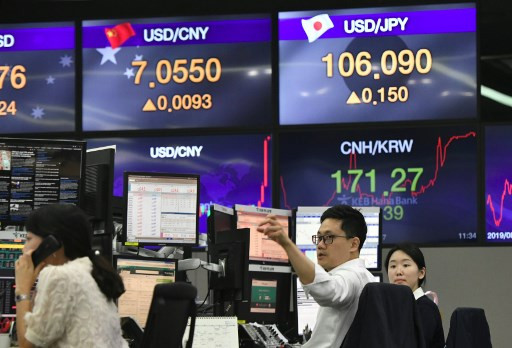Popular Reads
Top Results
Can't find what you're looking for?
View all search resultsPopular Reads
Top Results
Can't find what you're looking for?
View all search resultsChinese yuan falls to weakest level against dollar since 2010
US President Donald Trump reacted angrily later in the day, accusing China of deliberately and improperly weakening its currency.
Change text size
Gift Premium Articles
to Anyone
 Currency dealers monitor exchange rates in a trading room at the KEB Hana Bank in Seoul on August 6, 2019. The Chinese currency steadied on August 6, a day after Beijing let the yuan weaken against the dollar, sending markets into freefall and leading the US to formally designate China a (AFP/Jung Yeon-je )
Currency dealers monitor exchange rates in a trading room at the KEB Hana Bank in Seoul on August 6, 2019. The Chinese currency steadied on August 6, a day after Beijing let the yuan weaken against the dollar, sending markets into freefall and leading the US to formally designate China a (AFP/Jung Yeon-je )
T
he Chinese yuan fell to its lowest level against the dollar since August 2010 in morning trading on Monday, fuelling speculation that Beijing is allowing currency depreciation to counter threatened US tariffs.
US President Donald Trump reacted angrily later in the day, accusing China of deliberately and improperly weakening its currency.
"China dropped the price of their currency to an almost a historic low. It's called 'currency manipulation.' Are you listening Federal Reserve?" he said on Twitter, calling the change "a major violation" which would "greatly weaken China."
Near 1335 GMT, the offshore currency weakened to 7.1114 to the dollar -- the worst since 2010 -- days after US President Donald Trump announced a plan to impose fresh tariffs on another $300 billion in Chinese goods, sharpening trade war tensions between the world's two biggest economies.
The onshore yuan also tumbled, hitting 7.0536 in Monday morning trade to reach its lowest level since 2008.
Both the onshore and offshore yuan breached the 7.0 level against the dollar, which investors see as a key threshold in currency value.
Trump has frequently accused China of artificially depreciating its currency in order to support its exports -- charges long denied by Beijing.
So far the US Treasury Department has not formally accused China of currency manipulation either.
Trump jolted global stock markets last week when he announced more tariffs just a day after US and Chinese trade negotiators had completed their first face-to-face meetings since both sides declared a truce in June.
The extra 10 percent duties Trump plans to implement from September 1 would mean he has now targeted virtually all of the roughly $550 billion in goods America buys from China every year.
Global equity markets were in selloff mode Monday, with major indices in Asia, Europe and the United States down two percent or more.
Currency instability
China on Friday threatened to retaliate to any new US tariffs -- it has already imposed its own duties on $110 billion in American goods, almost all of the American products it imports.
A report from Bloomberg News said China has also asked its state-owned enterprises to stop buying US farm goods, in a further sign of escalating tensions.
The yuan is not freely convertible and the government limits its movement against the US dollar to a two percent range on either side of a central parity rate which the People's Bank of China (PBOC) sets each day to reflect market trends and control volatility.
The daily central rate was at 6.9225 per dollar on Monday, 0.33 percent weaker from Friday.
"It appears that the tariffs hike suggests the return of tit-for-tat moves and a suspension of trade talks, and the PBOC sees no need to keep the yuan stable in the near term," Ken Cheung, a senior currency strategist at Mizuho Bank, told Bloomberg News.
In a statement on Monday morning, the PBOC said the exchange rate against the US dollar had been "affected by unilateralism and trade protectionism measures and the imposition of tariff increases on China".
The central bank said the yuan remained "stable and strong against the basket of currencies" and said it would "resolutely crack down on short-term speculation and maintain stable operation of the foreign exchange market and stabilise market expectations".
It went on to say that it had the "experience, confidence and ability to keep the RMB exchange rate basically stable at a reasonable and balanced level".
Julian Evans-Pritchard, senior China economist with Capital Economics, said the PBOC has "effectively weaponized the exchange rate" by linking the currency with the US trade war.
"Given that their goal is presumably to offset some of the impact from additional US tariffs, they are likely to allow the currency to weaken further, probably by 5-10 percent over the coming quarters," said Evans-Pritchard.









